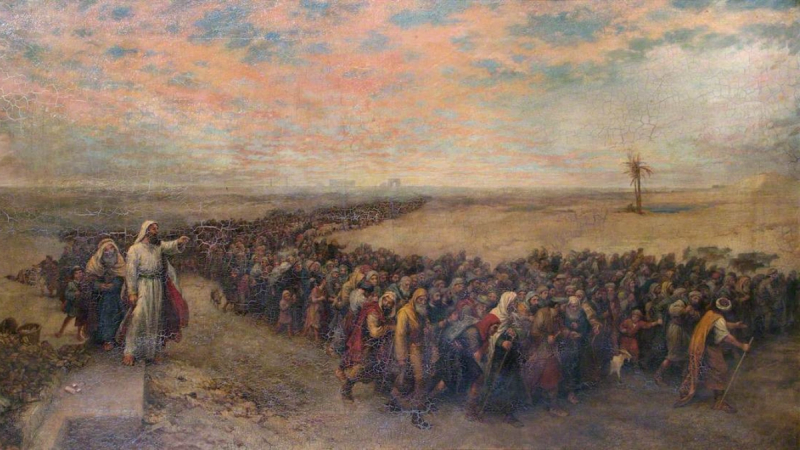Although it would be silly to rank the books of the Bible by their perceived importance or relevance, in many ways, the Book of Exodus looms large over much of both testaments. No other book is cited throughout the Old Testament as much as Exodus is, and only the Psalms and Isaiah’s prophecy are quoted more in the New. When we read Exodus, therefore, we are reading one of the most pivotal and formative texts in antiquity. It is a book that is brimming with history and theology, expanding upon all the ways God works in, through, and for his people. Genesis, of course, begins that narrative, since it is the book of “beginnings.” But Exodus provides an even narrower focus, offering a series of vivid pictures of what it means and what it looks like to belong to the one true God. Nevertheless, despite this precision, the narrative of Exodus is surprisingly broad, transcending a mere record of Israel’s dusty past and sketching a dramatic portrait of the redemptive work of God in Christ that continues to sustain the church in the present.
The opening foray of the book is a seven-verse preface, of sorts, that concisely, yet thoroughly, hurries through several centuries of history (Exod. 1:1–7). The author, whom I hold to be Moses, doesn’t digress to explain all the reasons why God’s people were in Egypt, since his readers could find that out for themselves by reading the Joseph account in Genesis. In fact, the connective tissue between Genesis and Exodus is even more apparent in Hebrew, since Moses’s opening word is “and,” directly linking those events with the sprawling narrative he’s about to tell. From beginning to end, the forty chapters of Exodus cover approximately four centuries of Israelite history. The bulk of the book, however, focuses on two of those years, with Chapters 3 through 40 centering on the exodus and the events at Sinai. This is why we refer to this book as “Exodus,” a title that comes from the Septuagint, meaning “exit.”
More Than History
There are many different ways to interpret Exodus, the most obvious of those being the historical approach. It should go without saying that this book is comprised of real people and real events that really took place. Exodus isn’t a mythic book, nor is it a book of Hebraic tall tales. Rather, Exodus is a story about how real people really suffered as they waited on God to deliver them, and how he really did deliver them by his own power and grace. Even still, reading and understanding Scripture “historically” isn’t the only approach one should take. Its narratives can and must be interpreted spiritually, as well. This, to put it plainly, means reading Scripture with an eye towards its ultimate fulfillment in the Christ of God.
Biblical history, of course, isn’t mere history for the sake of history. If one were to peruse any given high school or college history textbook, one might be confronted with a wealth of crucial information, but there wouldn’t be any life in it. The word of God, of course, is “living and active” (Heb. 4:12). It’s a book of life that gives life by constantly pointing us to the one who is the Resurrection and the Life. Accordingly, and spiritually speaking, then, how does Exodus give us life? Taking a bird’s eye view of Exodus, we’re able to see its narrative structure more broadly. At its heart, it’s a story about how the people of God “exited” bondage and entered into a life of freedom, service, and worship. All of its chapters paint a picture of how God brings his people out of one life and into another, into new life.
Exodus As a Picture of Salvation
Consequently, an apt way to make sense of the big picture of Exodus is by comparing it with Chapter 6 of Paul’s letter to the Romans, in which the apostle proclaims the good news that the church has been “set free from [slavery to] sin” and death, and “have become slaves of righteousness” (Rom. 6:18). Throughout this pivotal chapter, Paul evokes the “newness of life” that believers have because of Christ alone. Prior to Jesus, we were slaves to sin; we were in miserable and interminable bondage. But now that we know Jesus, by faith, we are made “slaves of righteousness.” Our old selves have been buried with Christ in baptism and raised to “walk in newness of life” (Rom. 6:4). In other words, part of the process of salvation is recognizing and relishing in the exodus that God has performed in our hearts. Through the death and resurrection of his Son, God has brought us out of the land of misery and death and into the realm of light, love, and righteousness.
Similarly, Exodus tells us about how God’s people were delivered from their bondage in Egypt and ushered into freedom to live, love, and serve the very One who delivered them. To put it another way, Exodus is Romans 6 acted out on the pages of Israel’s history. “Exodus is a picture of salvation,” Michael P. V. Barrett notes, “it is a picture prophecy of spiritual truths that find ultimate fulfillment in the person and work of Christ.” “For the rest of Scripture,” Allan M. Harman agrees, “the exodus provides the pattern of God’s redemptive activity.” The writers of the New Testament took a similar approach (Jude 1:5; 1 Cor. 10:1–4), as did the authors of the Old Testament (Exod. 13:14; cf. Ps. 81:10; Hosea 13:4–5; Micah 6:4).
In that way, Exodus has always been deeply formative for the people of God, and still is. What God did for Israel shows us who he is (Deut 7:6–8). “The book of Exodus,” Barrett continues, “pictures the gospel through the history of Israel; it visualizes spiritual realities.” It puts the heart of God on full display on the canvas of history. And as we read Scripture, therefore, God is telling us something about ourselves and about himself. It’s not just history; it’s revelation. “To read of Israel’s deliverance from Egyptian slavery as just a slice of ancient Near Eastern history,” to cite Barrett once again, “is to miss the divinely intended message.”
The Church in the Wilderness
This brings me to divulge my lens for interpreting this decisive book. Exodus is a window into how God in Christ rescues a people for himself and establishes a called-out assembly of worshipers and channels of his grace and mercy. In a word, Exodus is about the church in the wilderness, which is a reference to something Stephen says in his masterful sermon in Acts 7.
Without digressing too much, Chapters 6 and 7 of Acts relay the scene of Stephen’s trial in front of the same council that put Christ on the cross, and his subsequent sermon, throughout which he accomplishes much of what I’ve been expressing so far. Although he rehashes almost all of Israel’s long and storied history, his discourse wasn’t merely historical. After all, when was the last time a history lesson made you grind your teeth at the one teaching? (Acts 7:54). Nevertheless, nestled within Stephen’s comments on the Exodus is a reference to the “congregation [ἐκκλησία] in the wilderness” (Acts 7:38), which is the same term for the church used throughout the New Testament. Accordingly, the church, that is, the Body of Christ, wasn’t some brand-new construct that Jesus’s followers came up with in the aftermath of his ascension. Rather, the church was and is a spiritual assembly that God has been building and preserving throughout time.
From the days of slavery in Egypt to the journey in the wilderness to the dark days of the Middle Ages to right now, when going to church seems almost out of fashion, Exodus demonstrates through real people and real history Jesus’s promise that he is the one who safeguards his church, and nothing — absolutely nothing — not the most vindictive tyrant, the passing of time, or the gates of hell itself can prevail against it (Matt. 16:18).
If one were to scour the latest surveys or polls about the state of the church, one might quickly be consumed with despair. Data shows that church attendance, giving, and involvement are all in decline, leading analysts and experts to weigh in with their opinions on the death of the church and so forth. Be that as it may, one thing is certain: the longevity of the church isn’t determined by data, but by the patience and mercy of God Almighty. Nothing and no one can snuff out God’s church — not slavery, not genocide, not four decades of wandering. No amount of moral decadence, political corruption, or societal upheaval can ever bring down God’s “one, holy, catholic and apostolic Church.” And how do I know that? Because Exodus tells me so.
God’s People Under Egypt’s Thumb
“Now there arose a new king over Egypt,” Moses tells us, one “who did not know Joseph” (Exod. 1:8). A new era had begun. The old Egyptian favor once enjoyed by Jacob’s sons was nothing but a distant memory. As this new Pharaoh took stock of his domain, he noticed something alarming — namely, there were a ton of Israelites, so much so that “the land was filled with them” (Exod. 1:7). Egypt was, by that time, quite literally “swarming” (שָׁרַץ) with Israelites, which is a not so subtle indication that God was, even then, living up to his word (Gen. 15:5). The new Pharaoh viewed the sheer size of the Israelite population as a massive security threat, incentivizing him to make a seismic change in how the Egyptians and Israelites got along:
And he said to his people, “Behold, the people of Israel are too many and too mighty for us. Come, let us deal shrewdly with them, lest they multiply, and, if war breaks out, they join our enemies and fight against us and escape from the land.” Therefore they set taskmasters over them to afflict them with heavy burdens. They built for Pharaoh store cities, Pithom and Raamses . . . And the Egyptians were in dread of the people of Israel. So they ruthlessly made the people of Israel work as slaves and made their lives bitter with hard service, in mortar and brick, and in all kinds of work in the field. In all their work they ruthlessly made them work as slaves. (Exod. 1:9–11, 13–14)
All sense of goodwill was utterly destroyed, as Egyptian officials ruthlessly and mercilessly oppressed and afflicted every Israelite settler. Everything turned harsh and cruel for God’s people, with life itself becoming a “heavy burden” they were forced to bear (Exod. 1:11). But as devastating as this turn of events was, even then, God was keeping his word (Gen. 15:13–14; 46:3–4). Even in an era of oppressive politics and untold misery, God was at work. And how do I know that? Because, as Moses tells us, “the more they were oppressed, the more they multiplied and the more they spread abroad” (Exod. 1:12). Even though God’s people had been thrown into an “iron furnace” (Deut. 4:20; 1 Kings 8:51; Jer. 11:4), God was still causing them to grow and to multiply, just as he promised.
This is just who God is. He isn’t one to let any of his words fall to the wayside, let alone his people be utterly destroyed. When the world’s power-players “take counsel together,” as the psalmist tells us, “he who sits in the heavens laughs” (Ps. 2:2–4). He gets a chuckle every time despots make a go at exterminating his people. This, of course, is not only true for God’s chosen people, but also for all who belong to him, which means you and me. In fact, the same pattern of multiplying amid great oppression is a hallmark of the church.
The God Who Multiplies His Church
In Acts 8, with the church still in its infancy, a new era for those who confess that Jesus is the Christ begins, one where such a confession might just cost you your life, as it cost Stephen’s. After Stephen’s murder, those who put their hope in the resurrection of Jesus of Nazareth were being hunted down by Saul of Tarsus and hauled off to prison or to the gallows (Acts 8:1–3). Needless to say, it was a devastating time for the church, one that was filled with misery and death, not unlike the oppression that befell Israel in Egypt. And yet, despite all of that, what was the church’s response? What did they do? “Now those who were scattered” because of the persecution, Luke tells us, “went about preaching the word” (Acts 8:4). Those who were being afflicted weren’t being beaten into submission. Rather, they carried on proclaiming “the good news about Jesus” (Acts 8:35).
What Christ forecasted about his gospel mere moments before he ascended — that it should be spread abroad “in Jerusalem and in all Judea and Samaria, and to the end of the earth” (Acts 1:8) — was happening. In other words, the more the church was oppressed, the more it multiplied. Does this mean the church should pray to undergo some form of oppression? No, of course not. But it does mean that we shouldn’t be surprised if and when it arrives. After all, it’s no accident that the story of God’s people in Exodus begins with God’s people in suffering. Sometimes, that’s where God has us. But always, that’s where he shows up. That’s what he’s going to do for Israel by sending them a deliverer in Moses. But, in a truer and better sense, that’s what he does for the whole world by sending the person of his Son into the world “to give his life as a ransom for many” (Mark 10:45; 1 Tim. 2:6).
Exodus isn’t just a divine account of Israel’s liberation. It’s a preview of the gospel, of the person and work of Jesus, who “exoduses” sinners from the grave through his own death and resurrection. “What happened at the time of the release of the Israelites from slavery in Egypt,” Allan Harman concludes, “was intended to prepare for, and to teach concerning, the same principles coming to higher expression in the freedom from the bondage of sin through Christ.” Just as Moses was raised up to lead his people out of slavery, so, too, was Jesus raised up, “loosing the pangs of death, because it was not possible for him to be held by it” (Acts 2:24). The good news is that, in Christ, every sinner is made to exit the bonds of death and enter into the freedom of grace.







